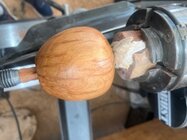Hi, I am Margaret Stiles in Fort Collins, Colorado. I have been turning for about 6 years. I like to turn a variety of things, I figure I’ll try anything once.
I am the vice president and program director for the Rocky Mountain Woodturning club. Our board of directors has discussed whether we should use an agreement or a contract when we book a demonstrator to come to our club. So far, I have been either calling or emailing potential demonstrators and then following up with an email that stipulates what we agree upon as far as the fee for their demo and a class and travel expenses. This gives me the details that I can refer back to as time goes by. I am just curious what other clubs use and if you would be willing to share what your club does. Thanks!
I am the vice president and program director for the Rocky Mountain Woodturning club. Our board of directors has discussed whether we should use an agreement or a contract when we book a demonstrator to come to our club. So far, I have been either calling or emailing potential demonstrators and then following up with an email that stipulates what we agree upon as far as the fee for their demo and a class and travel expenses. This gives me the details that I can refer back to as time goes by. I am just curious what other clubs use and if you would be willing to share what your club does. Thanks!




